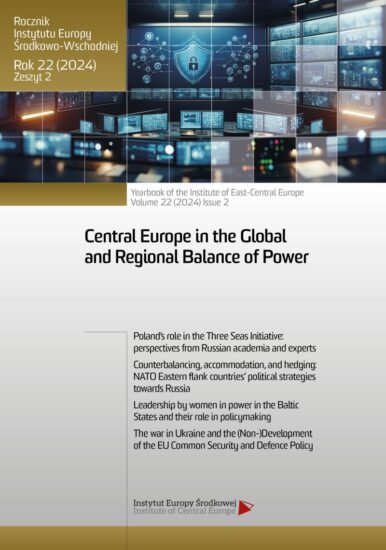Koncepcja bezpieczeństwa ontologicznego jako mechanizm wyjaśniający przyczyny rosyjskiej agresji wobec Ukrainy
ORCID: Michał Słowikowski: 0000-0001-5202-5080
Afiliacja: Uniwersytet Łódzki
Strony: 111-127
Wydanie: Lublin 2024
DOI: https://doi.org/10.36874/RIESW.2024.2.6
Sposób cytowania: M. Słowikowski, The concept of ontological security as an explanatory mechanism for the causes of Russian aggression against Ukraine, „Rocznik Instytutu Europy Środkowo-Wschodniej” 22 (2024), z. 2, s. 111-127, DOI: https://doi.org/10.36874/RIESW.2024.2.6
Słowa kluczowe: ontological security, Russia, Ukraine
Keywords: bezpieczeństwo ontologiczne, Rosja, Ukraina, wojna
Abstrakt: Celem tego artykułu jest rozpoznanie, w jakim stopniu badania nad rosyjską agresją wobec Ukrainy posunęły się naprzód, z wykorzystaniem jednej ze szkół stosunków międzynarodowych (SM) – bezpieczeństwa ontologicznego. Takie podejście ma na celu doprecyzowanie procesu wnioskowania w stosunku do klasycznych szkół SM. Artykuł opiera się na pierwszych artykułach naukowych dotyczących tego zagadnienia i krytycznie je ocenia. Wnioski płynące z ich krytycznej lektury pozwalają wskazać obecność istotnej luki poznawczej w odniesieniu do analizowanego problemu, co sugeruje potrzebę przeprowadzenia badań empirycznych nad rosyjskimi narracjami autobiograficznymi dotyczącymi czasu wojny, z wykorzystaniem specjalistycznych narzędzi interpretacyjnych.
Bibliografia:
1. Aleksandr Baunow – o rossijskoj dipłomatii i itogach putinizma, Polit.ru, 19 December 2023, https://polit.ru/articles/konspekty/aleksandr-baunov-o-rossiyskoy-diplomatii-i-itogakh-putinizma/ [8.04.2024].
2. Bogomolov A., Lytvynenko O., A Ghost in the Mirror: Russian Soft Power in Ukraine, Chatham House, January 2012, https://www.researchgate.net/publication/263853878_A_Ghost_in_the_Mirror_Russian_Soft_Power_in_Ukraine_The_Aims_and_Means_of_Russian_Influence_Abroad_Series_A_Ghost_in_the_Mirror_Russian_Soft_Power_in_Ukraine [8.04.2024].
3. Chrzanowski B., An Episode of Existential Uncertainty: The Ontological Security Origins of the War in Donbas, “Texas National Security Review” 2021, vol. 4, no. 3, pp. 11–32.
4. Dawson G., Smith N.R., Why Putin’s invasion of Ukraine had to happen, ECPR – The Loop, https://theloop.ecpr.eu/why-putins-invasion-of-ukraine-had-to-happen/ [8.04.2024].
5. Götz E., Putin, the State, and War: The Causes of Russia’s Near Abroad Assertion Revisited, “International Studies Review” 2017, vol. 19, no. 2, pp. 228–253.
6. Hansen F.S., Russia’s Relations with the West: Ontological Security through Conflict, “Contemporary Politics” 2016, vol. 22, no. 3, pp. 359–375.
7. Kazharski A., Civilizations as Ontological Security?: Stories of the Russian Trauma, “Problems of Post-Communism” 2020, vol. 67, no. 1, pp. 24–36.
8. Krickovic A., Sakwa R., War in Ukraine: The Clash of Norms and Ontologies, “Journal of Military and Strategic Studies” 2022, vol. 22, no. 2, pp. 89–109.
9. Mearsheimer J.J., The Causes and Consequences of the Ukraine War, CIRSD, 16 June 2022, https://www.cirsd.org/en/horizons/horizons-summer-2022-issue-no.21/the-causes-and-consequences-of-the-ukraine-war [8.04.2024].
10. Mearsheimer J.J., The Tragedy of Great Power Politics, London–New York 2001.
11. Mitzen J., Larson K., Ontological Security and Foreign Policy, Oxford Research Encyclopaedia of Politics, August 2017, https://doi.org/10.1093/acrefore/9780190228637.013.458 [8.04.2024].
12. Mitzen J., Ontological Security in World Politics: State Identity and the Security Dilemma, “European Journal of International Relations” 2006, vol. 12, no. 3, pp. 341–370.
13. Narozhna T., Revisiting the Causes of Russian Foreign Policy Changes: Incoherent Biographical Narrative, Recognition and Russia’s Ontological Security-Seeking, “Central European Journal of International & Security Studies” 2021, vol. 15, no. 2, pp. 56–81.
14. Our experts decode the Putin speech that launched Russia’s invasion of Ukraine, Atlantic Council, 22 February 2022, https://www.atlanticcouncil.org/blogs/new-atlanticist/markup/putin-speech-ukraine-war/ [8.04.2024].
15. Putin V., On the Historical Unity of Russians and Ukrainians, Kremlin.ru, 12 July 2021, http://en.kremlin.ru/events/president/news/66181 [8.04.2024].
16. Russia’s proposal to redraw European security “unacceptable,” U.S. says, Radio Free Europe. Radio Liberty, 17 December 2021, https://www.rferl.org/a/nato-russia-security-guarantees/31614168.html [8.04.2024].
17. Ryan K., Russia’s search for ontological security and the Ukraine Invasion, “Australian and New Zealand Journal of European Studies” 2023, vol. 15, no. 1, pp. 82–93.
18. Sakwa R., Russian Politics and Society. Fifth Edition, Routledge 2021.
19. Smith N.R., Assessing the Trajectory of West-Russia Relations in Eastern Europe: Gauging Three Potential Scenarios, “Global Policy” 2017, https://mpra.ub.uni-muenchen.de/84684/1/MPRA_paper_84684.pdf [8.04.2024].
20. Smith N.R., Dawson G., Mearsheimer, Realism, and the Ukraine War, “Analyse & Kritik” 2022, vol. 44, no. 2, pp. 175–200.
21. Speech and the Following Discussion at the Munich Conference on Security Policy, Kremlin.ru, 10 February 2007, http://en.kremlin.ru/events/president/transcripts/24034 [8.04.2024].
22. Stepanenko K., Kagan F.W., Bugayova N., Weakness is Lethal: Why Putin Invaded Ukraine and How the War Must End, Institute for the Study of War 1 October 2023, https://understandingwar.org/sites/default/files/Weakness%20is%20Lethal%20Why%20Putin%20Invaded%20Ukraine%20and%20How%20the%20War%20Must%20End%20PDF.pdf [8.04.2024].
23. Timofiejev I., Wojna Rossii i Ukrainy: bazowyj scenarij?, Valdai, 25 November 2021, https://ru.valdaiclub.com/a/highlights/voyna-rossii-i-ukrainy-bazovyy-stsenariy/[8.04.2024].
24. von Essen H., Danielson A., A Typology of Ontological Insecurity Mechanisms: Russia’s Military Engagement in Syria, “International Studies Review” 2023, vol. 25, no. 2, pp. 1–25.

PDF: Pobierz